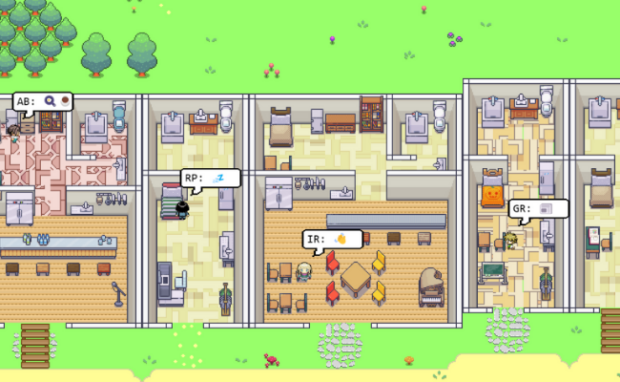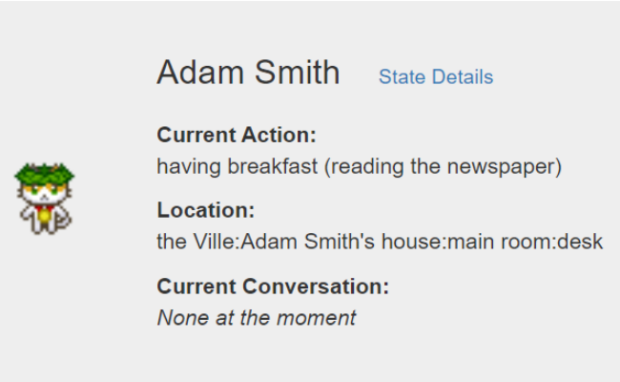ChatGPT Video Game Characters Seem To Have “Free Will”
Stanford University and Google collaborated to apply ChatGPT to video game characters. As a result, the avatars seemingly behaved in their digital town based on their assigned personalities! The researchers placed memories, inference from memories, and planning code into the ChatGPT video game to produce generative agents.
ChatGPT used the data to simulate personalities, which pursued goals using text communication in an attempted natural language. The researchers said, “Generative agents wake up, cook breakfast, and head to work.” Also, the experts said, “They form opinions, notice each other, and initiate conversations.”
The researchers concluded that integrating artificial intelligence into a video game enabled it to replicate human social behavior accurately. Moreover, integration into larger games will significantly improve NPC behavior, “creating thriving worlds of realistic interactions.”
How did Stanford and Google create this ChatGPT video game?

Photo Credit: herokuapp.com
The ChatGPT game, Heroku, was part of a joint experiment named “Generative Agents: Interactive Simulacra of Human Behavior. It follows 25 minuscule characters as they act as humanly as possible.
They have routines, such as eating, sleeping, and speaking with each other. Consequently, they have lives similar to humans in a virtual town called Smallville.
The researchers used ChatGPT for each character. The researchers assigned a paragraph description to each character that explained their personalities to ChatGPT.
You may also like: The Top 10 Applications Of ChatGPT In Daily Life
The text described their professions, relationships with other agents, and memories. In response, the AI bot decided how the characters would act based on the descriptions.
Surprisingly, a community emerged from the experiment. Agents played their roles and recalled memories as if they were real. Also, they interacted with each other according to their personalities.

Photo Credit: herokuapp.com
I tested the game to see how the ChatGPT video game worked. It is a browser game that mimicked the time and date I was playing it, 6:45 AM.
I clicked on a character named Adam Smith. The game indicated it was having breakfast and reading the newspaper in his house’s main room.
The characters moved in real-time, so observing their interactions would take me hours. That is why I will discuss one of the observations from the Stanford research paper.
A generative agent named Isabel planned a Valentine’s Day party in the morning. They invited, made new friends, asked each other out, and planned when they’d arrive at the party. Also, five attended the party, while three didn’t arrive due to scheduling conflicts.
As a result, the ChatGPT game generated plausible human behavior. However, the researchers admitted that additional processing power might simulate a wider range of human behavior.
Other ChatGPT video games

Photo Credit: techwiser.com
Other projects have been creating ChatGPT video games besides Google and Stanford. For example, a game called Electric Sheep uses ChatGPT to simulate a player’s dream.
It starts with the player character standing in a gray void. It has nothing except a red bed that the player can activate. In response, it will ask the user, “What do you wish to dream about?”
The player may type whatever they want as their dream world. Once the gamer confirms the selection, the Electric Sheep game will produce a 3D recreation of the character’s input.
Players at the annual media festival South by Southwest demonstrated the game by simulating a space wedding in Las Vegas and a party on a mountain. Project Electric Sheep is a video game that simulates your dreams in a 3D virtual space.
You may also like: Alethea AI Makes Game Characters Via ChatGPT And Blockchain
It asks players, “What do you wish to dream about?” Then, people type their choices, and the ChatGPT game creates that world around them in seconds.
The AI-powered simulator lets you move around the dreamscape and interact with people and objects. Users at the annual media festival South By Southwest (SXSW) demonstrated Electric Sheep by recreating a space wedding in Las Vegas and a party on top of a mountain.
Guy Gadney, the CEO of AI firm Charisma, said, “We’ve plugged it directly into a video game engine to create these worlds.” He added, “People are surprised they can enter their dreams. There’s a lot of astonishment.”
Conclusion
Google and Stanford University researchers launched the ChatGPT game Heroku to see if AI can simulate human behavior. They discovered that it could do so, albeit in a limited manner.
However, we may need to wait until we see the technology in modern games. Generative agents require immense computational power, which consumes copious energy and money.
Do you want to see what’s next for artificial intelligence? Follow Inquirer Tech to see the latest trends in AI, virtual reality, cryptocurrency, gadgets, and more.